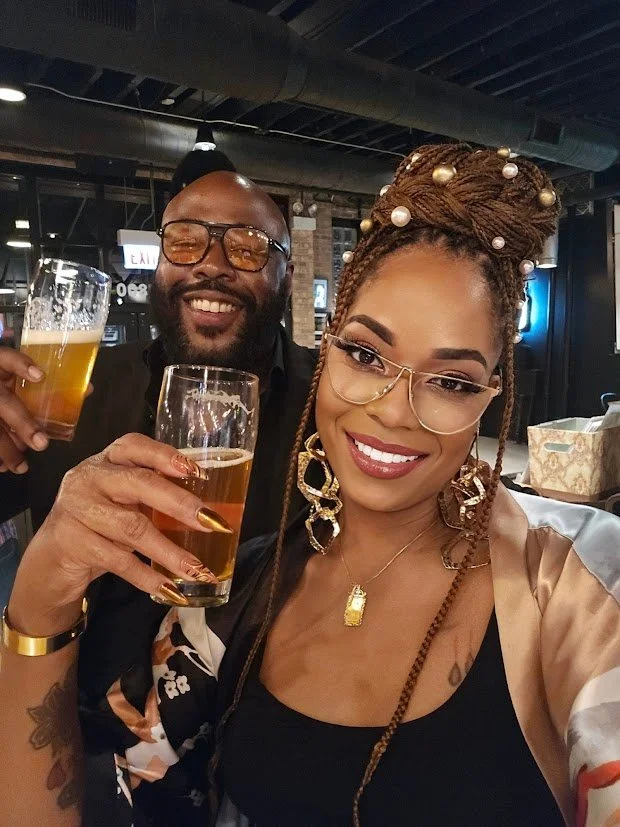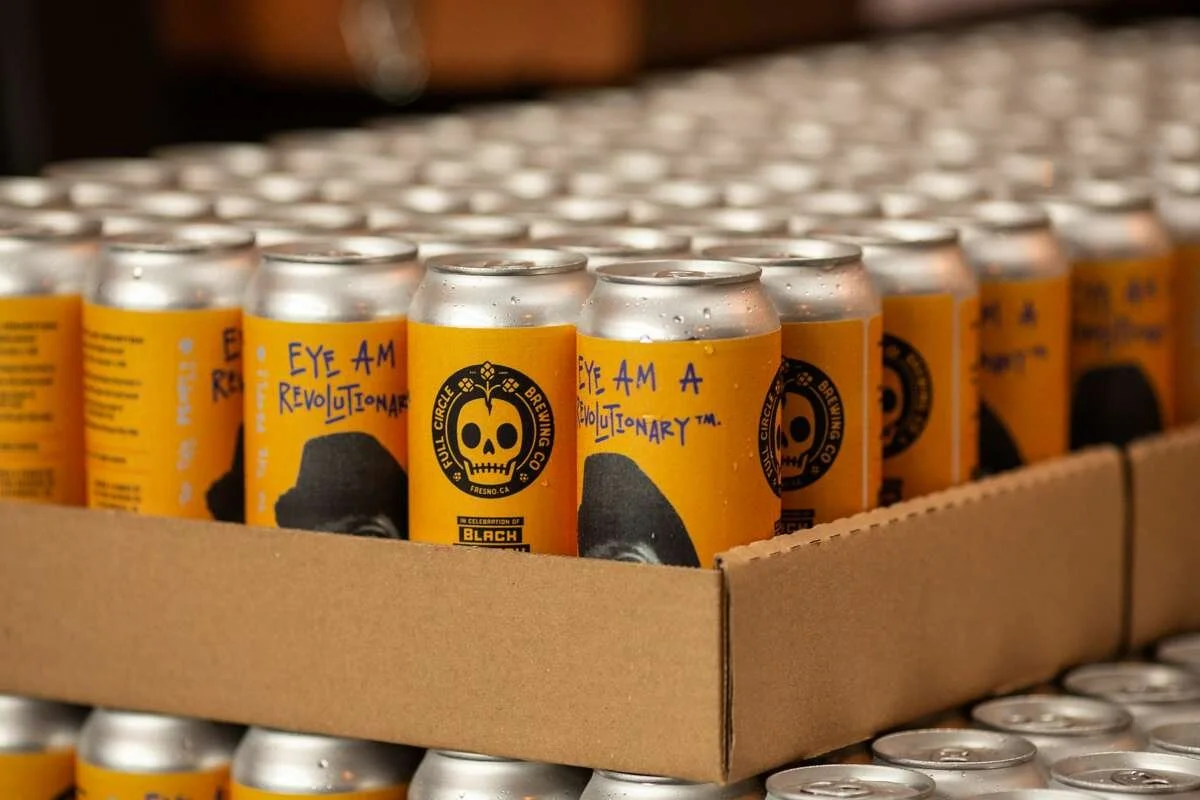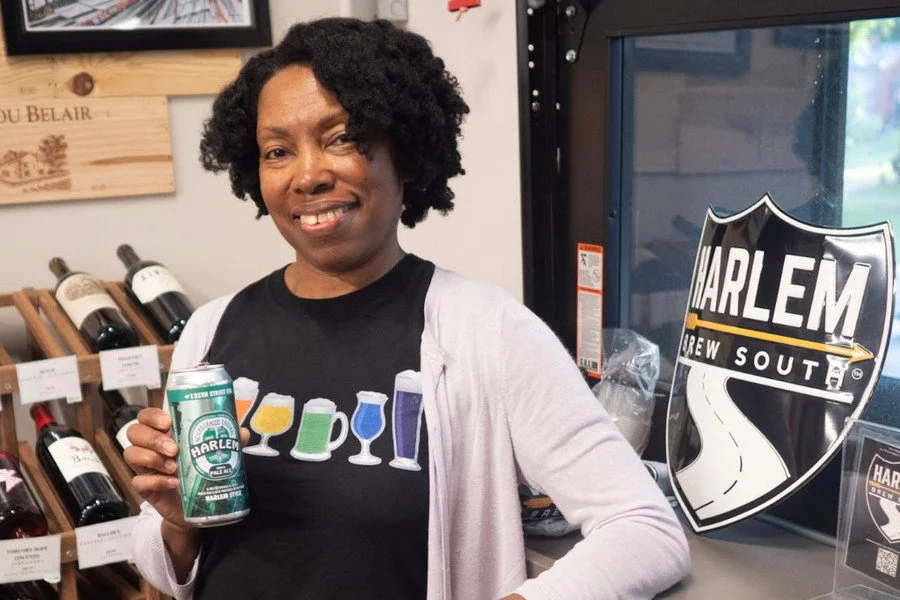Sip Smarter, Not Softer: The Afro.Beer.Chick Guide to Craft Beer 101
Let me tell you where this all started 🍺
My first real craft beer experience came courtesy of Nik White from Chicago Beer Geeks. Nik handed me a bottle of Goose Island’s Sofie, and that pour changed everything. Bright, citrusy, a little funky, and way too smooth. I didn’t even know beer could taste like that. Up until then, beer meant whatever was cheap and cold in a red cup at somebody’s barbecue. Sofie opened a door I didn’t even know existed 🔑
March 2010 first brewery visit during an epic birthday weekend romp.
Then Nik took me to my first brewpub, Goose Island on North Clybourn, on an unforgettable birthday romp 🎉 It was wild. My head was spinning from all the taps, the smells, the vibe, the energy. I was hooked. Nik turned me into a craft beer drinking machine. It got so bad I was showing up with beers for him to try.
When I first started drinking beer, I was stuck on Belgians and sweet stouts. I loved anything smooth, rich, and heavy on flavor. Over time, my taste grew up. I learned to love IPAs, and now I reach for less sweet stouts that still hit with depth but don’t taste like dessert. My palate matured, but my passion stayed the same 🔥
Of course, I fell into the trap 😅
Throwback to 2019, Nik and I are standing in Half Acre’s Benthic release line.
I was standing in line at sunrise for beer releases, paying stupid money for bottles that were more hype than flavor. There were weekends I dropped rent-sized cash chasing limited-edition brews just to say I had them. It was fun for a while, but let’s be honest, I’m too grown for that now 🙅🏾♀️
These days I drink smarter. No lines. No hype. No flexing. Just flavor, community, and good-ass beer 🍻
So if you’re new to craft beer, this is your Craft Beer Survival Kit, straight from someone who’s been through the hype and still loves this culture like day one 💯
👅 Start Where Your Taste Buds Are
Stop pretending you like bitter IPAs if you don’t. Nobody’s handing out medals for suffering through a pint that tastes like pine needles and bad decisions 😂
If you like sweet drinks, grab a wheat beer, fruited sour, or cream ale.
If you love coffee or chocolate, grab a porter or stout.
If you’re the shot-taking, tequila-loving type, slide into a Belgian tripel or a strong ale.
Your taste buds don’t need validation. Drink what makes sense to you 🍺
Or you could have a dope ass universal ABC glass.
📸 Glassware Ain’t Just for the Gram
Yeah, those fancy glasses look cute in photos, but they actually make a difference. The right glass brings out aroma, flavor, and the whole experience.
🍺 Pint glass: the classic. Reliable.
🍷 Tulip or snifter: for dark, bold beers that hit heavy.
🥂 Weizen glass: tall and curvy, built for wheat beers.
You don’t need a full bar setup, but at least have one decent glass. Don’t drink a good beer out of a plastic cup like it’s college again 😬
🧠 Learn to Taste, Not Just Drink
Beer isn’t a chug contest. Slow down and pay attention.
👃🏾 Smell it first. Half the flavor lives in the aroma.
👅 Let it roll across your tongue.
🧐 Notice what you taste. Citrus, caramel, coffee, sometimes straight-up grass. Brewers love to experiment, and that’s part of the fun.
Once you know what you like, you stop wasting money on beer that doesn’t fit you 💰
🙄 Ditch the Beer Bros
There’s always that one dude at the bar who thinks he’s the beer whisperer. Let him talk. You sip.
No one’s taste buds are superior. You can love a cheap can or a top-shelf bottle. You can drink lagers one day and smoothie sours the next.
Beer snob culture is dead 💀 Drink what makes you happy ✨
📱 Use Your Phone Like a Pro
Your phone is your beer sidekick. Use it to find local breweries and taprooms near you 📍 Most are chill, creative spaces where real people pour real beer. Follow them on social media to find food trucks, beer drops, and live events 🎶
And always take a pic of what you’re drinking. Your phone remembers what your buzzed brain won’t 🤳🏾
💵 Don’t Go Broke Chasing Craft
Beer FOMO is real. I’ve been there. I used to blow cash on bottles just because everyone else was. I’ve stood in line for hours for a beer that didn’t even slap.
Now I know better. You don’t need to chase hype to drink good beer. Try flights. Split bottles. Support your local spots instead of sweating over the next big release 🍻
Sip smarter, not harder 💡
🙋🏾♀️ Ask Questions
Nobody walks into craft beer knowing everything. Ask the bartender what’s good. Tell them what you like. Most of them actually want to help you find your vibe.
Asking questions doesn’t make you a rookie. It makes you curious, and that’s how you learn 💬
✨ Final Sip
16 years later, back to the scene where it started, same brewery just a different location, Goose Island on Fulton.
My beer story started with one bottle of Sofie that opened my world. From that first sip at Goose Island on North Clybourn to all the breweries, bottles, and memories since, I’ve grown, learned, and found my own lane.
Now I drink what I like. I support the brewers who care about the culture. And I don’t stand in line for hype anymore because good beer will always find you when you know your flavor 🍺
You don’t have to know everything to belong here. Just show up, sip, and own your space 💫








